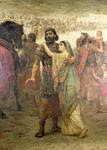Beethoven, the unpredictable and life after Covid
Admittedly this is a tad nerdy, but over the last few months, in celebration of the 250th birth of Ludwig van Beethoven, I've listened to, and indeed watched, the entire Beethoven symphonies, all nine of them, performed by the Berlin Philharmonic Orchestra, conducted by Sir Simon Rattle. I've listened to them in chronological order beginning with the First Symphony which is classical in style, though still unmistakably Beethoven, and concluding with the Ninth, which is revolutionary, and unmistakably Beethoven!
The Ninth Symphony has a very special place in my life. I heard it when I was a very young boy, more specifically the 'Ode to Joy', and fell in love with music, an affair which has only gone deeper as the years have gone by. My first ever LP, received as a Christmas present, was of the Ninth Symphony, on the Marble Arch label. I have kept it for sentimental reasons. Strangely, I have mixed feelings about this symphony. I love the first three movements, and the initial entry of the 'Ode to Joy' theme, played sotto voce by double basses and cellos, joined shortly after by a bassoon weaving a counter melody, still sends shivers down my broken but mending spine! But then I find some of it gets a bit overblown. In the performance I heard the quartet of singers were excellent and contained but this isn't always the case!
The thing about the Ninth Symphony is the way that even at this stage - having blown convention to the wind as early as the Third Symphony by taking the direction of classical music in a radically new direction by the ninth note of the opening phrase - Beethoven still has lots more in store.
There is a moment in the final movement of the Ninth Symphony, when the music reaches a climax on a mighty unresolved chord which is followed by a silence. The question is, 'where next?' and Beethoven is totally unpredictable. What follows has been described as a 'fart' by the conductor and musicologist Roger Norrington. Two bassoons, a contra bassoon and a bass drum intervene in the wrong key, in a different tempo, on the wrong beat of the bar, a huge contrast to all that had preceded it!
I'm struck by the unpredictable in music. Beethoven was by no means the first to use it and he wasn't the last. And actually interesting music depends on some degree of unpredictability, what is called the principle of expectancy violation. Haydn's Surprise Symphony is an obvious example but Beethoven took music to a place where it had never been before. He invented the future and in this sense he was a revolutionary.
We are currently living in extraordinary times. I think it is unlikely that we'll look back on 2020/21 and say that it wasn't a big deal. Aside from the sheer tragedy of the situation for many people at so many levels, the question is 'where next?' In relation to the church there are those who paint an exciting picture of what might be with the opportunity to, as it were, reset. There are those who are less optimistic and simply want a return to what was, maybe with a few tweaks. And there are those who are hedging their bets with something of a mixed economy.
Damian Howard SJ, in an article in The Tablet, looking at 'Utopia, Dystopia and Life After Lockdown', does a quick trail through Church History making the point that throughout it has been wholly unpredictable. A reading of the Acts of the Apostles prepares the way. 'It's been a rollercoaster of blessing and grace, struggle and death and new life. That shouldn’t surprise anyone who believes in the incarnation and in the paschal mystery. Because this God is always creating anew. There is no steady state. Jesus Christ isn’t that kind of person, as you will notice if you read the Gospels attentively.'
Unpredictability is something that has become familiar to me, having been diagnosed with a serious medical condition that resulted in six weeks in hospital and ongoing treatment. I could not have imagined being in this situation this time last year. The condition is highly treatable and so the future is positive but ultimately it is incurable. For me, personally, the music has taken a very different turn from the one I expected. And it has for our society and our churches. What next? is a question we may be asking for a long time to come and I warm to the writings of Walter Brueggemann and Tom Wright who are hesitant to come up with any ready answers. However, I am taken with a comment by Roy Searle that we are being called to be 'co-creators of the future with God rather than curators of the past for God'. This seems to be key and whatever, that future is likely to have a considerable measure of the unpredictable.


Comments